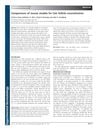glaucoma medication with hair follicle stimulant effects
extract, clone, and reinsert your own hair cells
an anticonvulsant repurposed for hair loss via histone inhibition
an estrogen promoting hair regrowth more commonly used in women
signaling protein that, when suppressed, may grow hair by reducing inflammation and stem cell loss




